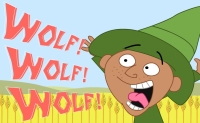The
Boy Who Cried Wolf -
Another moral
to the story
The
story:
A shepherd-boy, assigned to watch a flock of sheep, soon became
bored with his task,. So he decided it would be fun to
get
the sheep owners to come to the flock by yelling "Wolf! Wolf!
Wolf!"
He did this several time, and then laughed at the
hapless villagers
each time
they came running to drive off the nonexistent wolf.
Nowadays, folks might well accuse the boy of using a "scare"
tactic
Eventually, a wolf actually came, and once again the boy cried
"Wolf! Wolf! Wolf! Please come! The wolf
is killing and
eating the sheep!" But this time, tired of
his lies, the villagers did not believe him. So they did
not come. And the wolf proceeded to destroy the whole
flock.
The generally accepted moral of the story:
Don't tell lies.
If you lie
a lot, no one will believe you when you tell the truth.
So don't tell lies.
 But is this
the only moral? Yes, thatís what happens in the story. The boy
cries wolf many times when there is no wolf. Then when there is
a wolf, no one believes him, and the flock is destroyed.
If you stop at this point, with your focus on the boy, the above moral appears to be the
lesson in this story.
But is this
the only moral? Yes, thatís what happens in the story. The boy
cries wolf many times when there is no wolf. Then when there is
a wolf, no one believes him, and the flock is destroyed.
If you stop at this point, with your focus on the boy, the above moral appears to be the
lesson in this story.
Who's the real
loser?
The boy? Well, yes, he
loses credibility, and that's not good. But he's not the
only loser. The real losers are the owners of the
sheep. They decide not to believe him, when heís actually
telling the truth, and the wolf destroys the flock.
So here's
what we think is another and more important moral of the story:
Check for yourself.
Sometimes you have to check
for yourself, and if you can't, get others to check for you...or,
as we used to say, "Better safe than sorry."
In other
words: Do a reality check and risk analysis, before your decide.
When someone tells you something,
donít just decide whether they are telling the truth, or not.
Also decide what the costs, or the risks might be if you believe, or donít
believe what youíve been told. And if you judge the risk
and possible cost to be high, check for yourself. In other
words,
do a reality check. And if that doesn't work (remember,
sometimes reality is hard to see) consider taking action anyway.
All of this can be especially important when the
information is something you don't want to hear. Don't kill the messenger.
And...remember this: A liar can tell the truth.
Which is,
of course, another reason to do a reality check.
Back to the
boy who cried wolf:
If someone tells you your
flock is at risk, youíre better off believing it, even if it is
a lie, on the chance that it is true. You stand to lose a
lot if this one time it is true. The foolish flock
owners didnít take into account the possible risks, and they
lost their sheep.
They didnít
do a risk analysis, or a cost/benefit analysis. If the boy had
lied about something less risky, like say telling them it was
going to rain, they could have decided he was lying without
risking a major loss.
And finally,
they didn't do a reality check--they didn't go see for
themselves
Some final words:
 First,
we're not dismissing the original moral of the story. It
is a good idea to maintain our credibility. We're in favor of
telling the truth. In fact, that's part of what motivated us to
put up this web site. We want to peel away misinformation,
confusion, and even downright lying in order to see reality.
But when it comes to the story about the boy who cried wolf, we
think there's a more important message in the story, one that
concerns how we handle risk.
First,
we're not dismissing the original moral of the story. It
is a good idea to maintain our credibility. We're in favor of
telling the truth. In fact, that's part of what motivated us to
put up this web site. We want to peel away misinformation,
confusion, and even downright lying in order to see reality.
But when it comes to the story about the boy who cried wolf, we
think there's a more important message in the story, one that
concerns how we handle risk.
 Second,
for those who might be interested, saying something is true
(e.g., "The wolf is killing the flock"), when it is not true
(there is no wolf), is
called a "False Positive." Saying something is not true
(e.g., "The boy is lying, there is no wolf") when it is true
(there is a wolf) is
called a "False Negative." Either of these can occur when
people try to see reality.
Second,
for those who might be interested, saying something is true
(e.g., "The wolf is killing the flock"), when it is not true
(there is no wolf), is
called a "False Positive." Saying something is not true
(e.g., "The boy is lying, there is no wolf") when it is true
(there is a wolf) is
called a "False Negative." Either of these can occur when
people try to see reality.
 To read
about Killing the Messenger
To read
about Killing the Messenger
 To read about False Positives and False Negatives
To read about False Positives and False Negatives
 To
go to the brief introduction to Hot Topics
To
go to the brief introduction to Hot Topics
 To
go to the Articles Page
To
go to the Articles Page